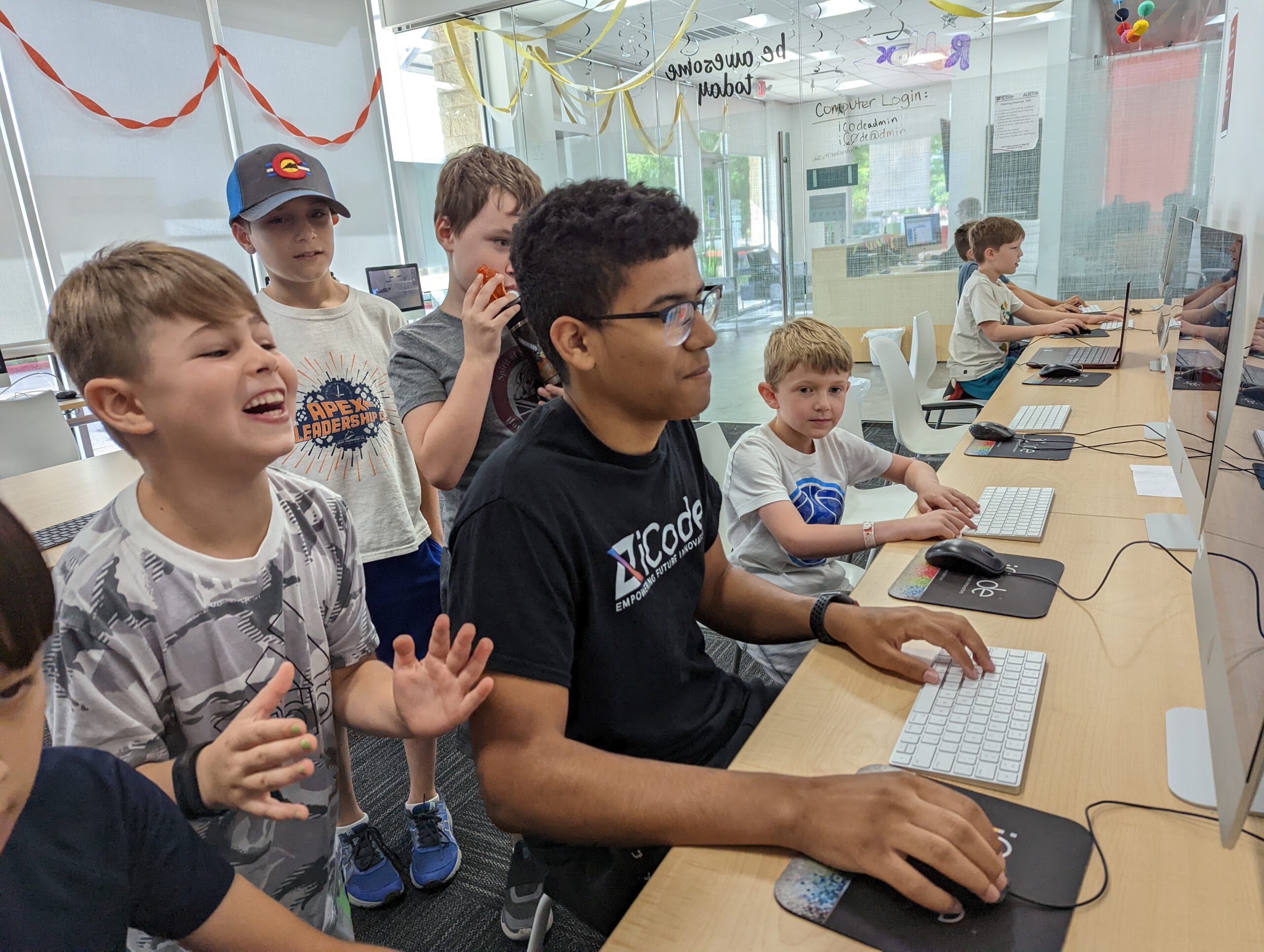Computational thinking is a problem-solving approach that involves breaking down complex problems into smaller, more manageable parts, identifying patterns, and creating step-by-step solutions that can be executed by a computer or human. It is a fundamental skill that extends far beyond coding and programming, enabling individuals to tackle challenges in various domains effectively.
At its core, computational thinking involves several key components:
- Decomposition: Breaking down a complex problem into smaller, more manageable parts.
- Pattern Recognition: Identifying similarities or trends that can inform a solution.
- Abstraction: Focusing on the essential details while ignoring irrelevant information.
- Algorithmic Thinking: Developing a step-by-step set of instructions to solve a problem.
By learning computational thinking, children develop critical thinking, logical reasoning, and problem-solving abilities that are valuable in all aspects of life. They learn to approach challenges systematically, break them down into manageable steps, and devise efficient solutions.
Moreover, computational thinking fosters creativity and innovation. As children grapple with complex problems, they learn to think outside the box, consider multiple perspectives, and explore alternative solutions. This mindset is invaluable in an ever-changing world, where adaptability and innovation are crucial for success.
While coding and programming are essential components of computer science education, computational thinking transcends these specific skills. It equips children with a versatile toolkit that can be applied to various disciplines, from science and mathematics to art and literature. By cultivating computational thinking, we empower the next generation to tackle complex challenges, drive innovation, and shape the future.
AI and Automation in Coding
While AI has made significant strides in code generation, it is important to understand its current limitations and the need for human oversight. AI systems, like language models and code assistants, are trained on vast amounts of existing code and can generate functional code snippets or even complete programs based on prompts or specifications. However, these systems are not truly intelligent in the sense of understanding the underlying concepts, logic, and context of the code they generate.
AI-generated code can be useful for automating repetitive tasks, generating boilerplate code, or providing code suggestions and completions. However, it often lacks the nuanced understanding, optimization, and creativity that human developers bring to the table. AI systems may produce code that works but is inefficient, lacks proper documentation, or fails to consider edge cases and error handling.
Moreover, AI systems can perpetuate biases present in their training data, leading to potential issues with fairness, security, and reliability. They may also struggle with complex, domain-specific problems or tasks that require deep domain knowledge and reasoning.
While AI can assist and augment human developers, it is unlikely to fully replace them in the foreseeable future. Human oversight, critical thinking, and domain expertise remain crucial for ensuring the quality, reliability, and maintainability of software systems. Additionally, humans are better equipped to understand and address the ethical and social implications of the technology they create.
Understanding Technology as Creators
As technology becomes increasingly integrated into every aspect of our lives, it’s crucial for children to move beyond being mere consumers of technology and develop an understanding of how it works. Computer science education empowers kids to become creators, innovators, and problem-solvers in the digital age.
By learning computer science concepts and programming, children gain insights into the inner workings of the technologies they use daily. They develop an appreciation for the complex systems and algorithms that power everything from smartphones and social media platforms to video games and smart home devices. This understanding fosters a deeper respect for technology and its impact on society.
Moreover, computer science education encourages children to approach technology with a critical and analytical mindset. They learn to question how technologies are designed, how they function, and how they can be improved or adapted to solve real-world problems. This mindset cultivates curiosity, creativity, and a desire to continually learn and evolve alongside technological advancements.
Ultimately, by understanding technology as creators rather than just consumers, children gain the skills and confidence to shape the digital world around them. They become empowered to identify opportunities for innovation, develop solutions, and contribute to the ever-evolving technological landscape.
Developing Creativity and Critical Thinking
Computer science education plays a pivotal role in nurturing creativity and critical thinking skills in children. While AI and automation may handle certain coding tasks, the ability to think creatively and critically is essential for solving complex problems and driving innovation.
Through computer science education, children learn computational thinking, a problem-solving approach that involves breaking down complex problems into smaller, manageable parts. They develop skills such as pattern recognition, abstraction, and algorithmic thinking, which are transferable to various domains beyond coding.
By engaging in hands-on coding projects and challenges, children are encouraged to think outside the box and explore multiple solutions. They learn to approach problems from different angles, experiment with various strategies, and iterate on their ideas. This process fosters creativity, as they discover innovative ways to tackle challenges and develop unique solutions.
Furthermore, computer science education promotes critical thinking by teaching children to analyze problems, evaluate different approaches, and make informed decisions. They learn to question assumptions, identify potential pitfalls, and consider the implications of their solutions. This analytical mindset is invaluable in navigating the complexities of the modern world and making well-reasoned choices.
Importantly, computer science education emphasizes the importance of testing and debugging, which cultivates perseverance and resilience. Children learn that failures and setbacks are part of the learning process and that persistence and a growth mindset are essential for overcoming challenges.
By fostering creativity and critical thinking, computer science education equips children with the essential skills to thrive in an ever-changing world, where problem-solving, adaptability, and innovation are paramount.
Preparing for Future Careers
The demand for computer science skills is rapidly increasing across various industries and professions. As technology continues to shape our world, individuals with a strong understanding of computational thinking, programming, and digital literacy will have a significant advantage in the job market.
While AI and automation are transforming the way we approach coding and software development, human expertise remains crucial. Professionals who can effectively communicate with technology, analyze data, and solve complex problems will be highly sought after. Computer science education equips students with the ability to think critically, break down complex problems, and develop innovative solutions.
Moreover, the job market is constantly evolving, and many future careers have yet to be conceived. By learning computer science principles and developing a solid foundation in programming and technology, students will be better prepared to adapt to new job roles and industries. They will possess the flexibility and problem-solving skills necessary to navigate the ever-changing landscape of the modern workforce.
Regardless of their chosen career path, whether in healthcare, finance, education, or any other field, individuals with computer science knowledge will have a competitive edge. They will be able to leverage technology to streamline processes, automate tasks, and drive innovation within their respective industries.
Building Confidence and Perseverance
Computer science education plays a crucial role in developing resilience, persistence, and a growth mindset in students. The process of learning to code and solve complex problems requires a significant amount of trial and error, debugging, and overcoming challenges. Through this iterative process, students develop the ability to persevere in the face of difficulties and cultivate a mindset that embraces failure as a learning opportunity.
When students encounter errors or roadblocks in their coding projects, they learn to approach these challenges with a problem-solving mindset. Instead of feeling discouraged or giving up, they are encouraged to analyze the issue, break it down into smaller parts, and systematically work through potential solutions. This process not only reinforces their understanding of programming concepts but also builds their confidence in their ability to overcome obstacles.
Moreover, computer science education emphasizes the importance of continuous learning and improvement. As technology rapidly evolves, students must be prepared to adapt and acquire new skills throughout their lives. By fostering a growth mindset, computer science education equips students with the belief that their abilities are not fixed but can be developed through dedication and hard work. This mindset empowers them to embrace challenges, seek feedback, and continuously strive for personal and professional growth.
Hands-on coding projects and collaborative learning environments further contribute to building confidence and perseverance. When students work together to tackle complex problems, they learn to support and encourage one another, celebrating small victories along the way. This positive reinforcement and sense of community foster a growth mindset, where students feel empowered to take risks, learn from mistakes, and persist through difficulties.
Overall, computer science education equips students with the resilience, persistence, and growth mindset necessary to thrive in an ever-changing technological landscape. By embracing challenges, learning from failures, and continuously striving for improvement, students develop the confidence and perseverance to tackle complex problems and adapt to new situations throughout their academic and professional careers.
Fostering Collaboration and Communication
Computer science education plays a crucial role in developing essential collaboration and communication skills in students. In today’s interconnected world, the ability to work effectively in teams and communicate ideas clearly is vital for success in any field.
Through computer science projects and assignments, students learn to break down complex problems into manageable tasks, assign roles and responsibilities, and coordinate their efforts to achieve a common goal. They engage in discussions, share their ideas, and learn to listen to and respect different perspectives. This process fosters teamwork, conflict resolution, and the ability to communicate technical concepts to both technical and non-technical audiences.
Moreover, computer science education often involves pair programming or group coding exercises, where students collaborate on writing and debugging code. This hands-on experience teaches them to articulate their thought processes, give constructive feedback, and incorporate suggestions from others. It also encourages them to develop a shared understanding of the problem and the solution, which is essential for effective collaboration.
Furthermore, many computer science projects require students to present their work to classmates, instructors, or even external stakeholders. This experience helps them develop public speaking skills, learn to tailor their communication to different audiences, and gain confidence in presenting complex ideas clearly and concisely.
By emphasizing collaboration and communication throughout the learning process, computer science education equips students with invaluable skills that transcend the technical realm. These skills are highly valued in various industries and professions, making computer science graduates well-prepared for success in a wide range of careers.
Promoting Diversity and Inclusion
Computer science education plays a crucial role in promoting diversity and inclusion within the field of technology. Historically, certain groups have been underrepresented in computer science and related fields, leading to a lack of diverse perspectives and experiences. By exposing students from diverse backgrounds to computer science at an early age, we can broaden participation and cultivate a more inclusive and innovative tech industry.
Introducing computer science education to students from diverse socioeconomic, racial, and cultural backgrounds can help break down barriers and stereotypes that may have discouraged them from pursuing careers in this field. When children see role models and peers who share their backgrounds excelling in computer science, it can inspire them to explore these opportunities and challenge the notion that certain groups are inherently better suited for technology.
Moreover, computer science education can empower students from underrepresented groups to become creators and innovators, rather than just consumers of technology. By learning to code and develop software, they can shape the technologies that impact their communities and address the unique challenges they face. This not only promotes diversity in the tech workforce but also ensures that the products and services created are inclusive and cater to a wider range of users.
Inclusive computer science education also fosters collaboration and teamwork among students from diverse backgrounds. Working together on coding projects and problem-solving tasks can help students appreciate different perspectives, learn from one another, and develop essential skills for success in a globalized and interconnected world.
By promoting diversity and inclusion in computer science education, we can cultivate a more equitable and innovative tech industry that reflects the diversity of our society and benefits from the unique talents and perspectives of all individuals.
Ethical and Social Implications
As technology continues to advance at an unprecedented rate, it becomes increasingly important for children to understand the ethical and societal implications of these advancements. While AI and automation may write code more efficiently, it is crucial for young minds to grasp the complexities and potential consequences of these technologies.
By learning computer science, children develop a deeper comprehension of how technology works, enabling them to critically analyze its impact on various aspects of life. They gain insights into issues such as privacy, data security, algorithmic bias, and the potential for job displacement. This understanding empowers them to become responsible creators and consumers of technology, capable of making informed decisions and advocating for ethical practices.
Moreover, computer science education fosters a sense of social responsibility and empathy. Children learn to consider the diverse needs and perspectives of different communities, ensuring that technology is developed and utilized in a manner that benefits society as a whole. They explore ways to leverage technology for social good, addressing global challenges such as healthcare, education, and environmental sustainability.
By encouraging critical thinking and ethical reasoning, computer science education equips children with the tools to navigate the complexities of an increasingly technology-driven world. They become agents of positive change, capable of shaping the future of technology in a responsible and inclusive manner.
Lifelong Learning and Adaptability
In our rapidly evolving technological landscape, the ability to continuously learn and adapt is paramount. Computer science education provides a solid foundation for nurturing these essential skills from an early age. As AI and automation reshape various industries, equipping children with computational thinking and problem-solving abilities becomes crucial for their future success.
Computer science education encourages a growth mindset, fostering a willingness to embrace new challenges and continually expand one’s knowledge and capabilities. By exposing students to programming concepts, algorithms, and data structures, they develop a systematic approach to breaking down complex problems into manageable components. This analytical thinking process transcends coding and becomes a valuable asset in navigating the ever-changing technological landscape.
Moreover, computer science education emphasizes the importance of staying up-to-date with emerging technologies and trends. Students learn to embrace change as an opportunity for growth, recognizing that the field of technology is constantly evolving. They develop a curiosity and eagerness to explore new tools, languages, and frameworks, understanding that continuous learning is essential for adapting to the demands of the future job market.
Furthermore, computer science education cultivates resilience and perseverance, traits that are crucial for lifelong learning. Debugging code, troubleshooting issues, and overcoming obstacles are inherent parts of the programming process. By experiencing these challenges firsthand, students develop the tenacity and problem-solving skills necessary to tackle new concepts and technologies as they emerge.
In a world where the only constant is change, computer science education lays the groundwork for individuals to thrive as lifelong learners and adaptable professionals. It equips them with the mindset, skills, and tools to embrace technological advancements, continuously expand their knowledge, and remain relevant in an ever-evolving digital landscape.









